人教新目标版七年级下册 Unit 10 I'd like some noodles Section A 课件(共30张PPT)
文档属性
| 名称 | 人教新目标版七年级下册 Unit 10 I'd like some noodles Section A 课件(共30张PPT) |  | |
| 格式 | ppt | ||
| 文件大小 | 7.3MB | ||
| 资源类型 | 教案 | ||
| 版本资源 | 人教新目标(Go for it)版 | ||
| 科目 | 英语 | ||
| 更新时间 | 2023-07-07 08:48:39 | ||
图片预览

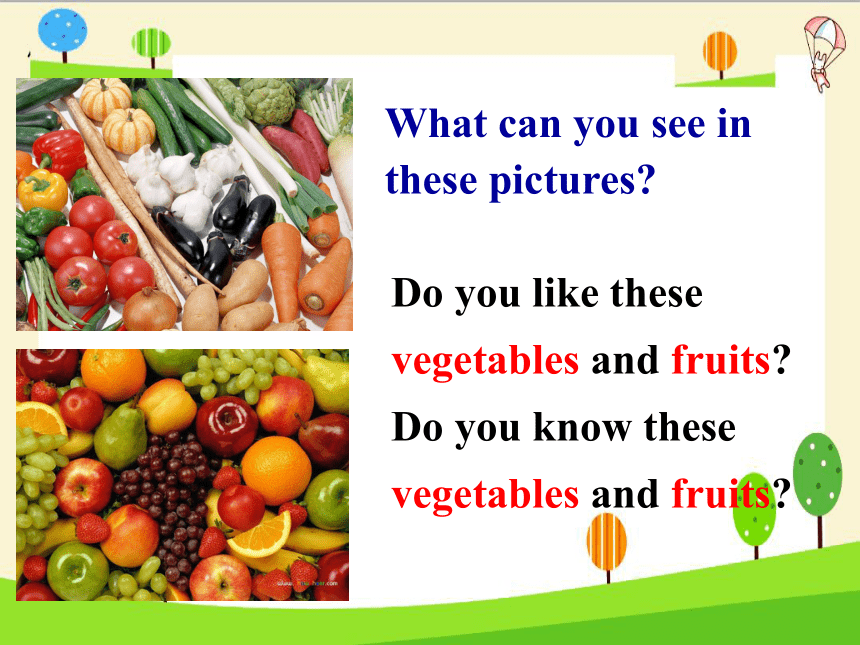

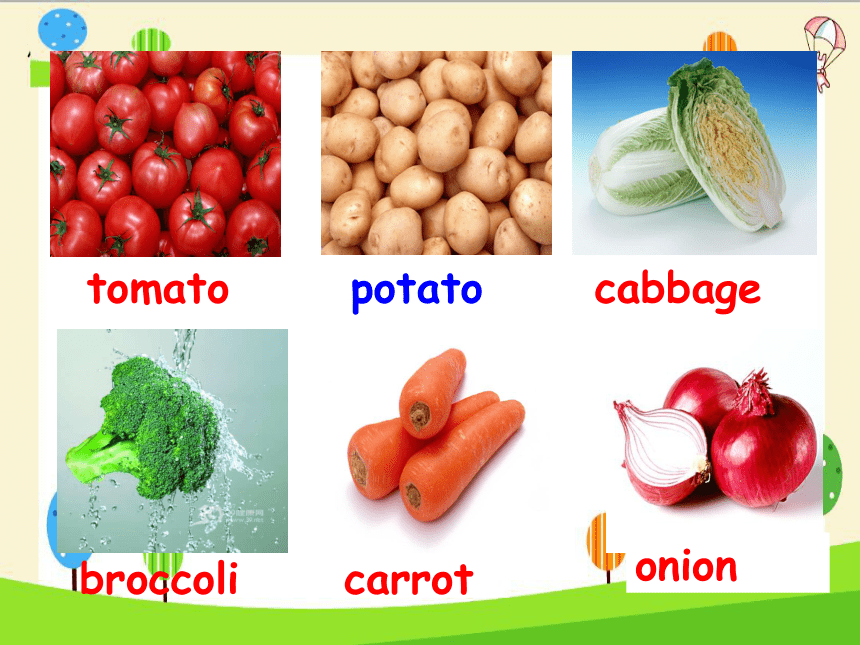
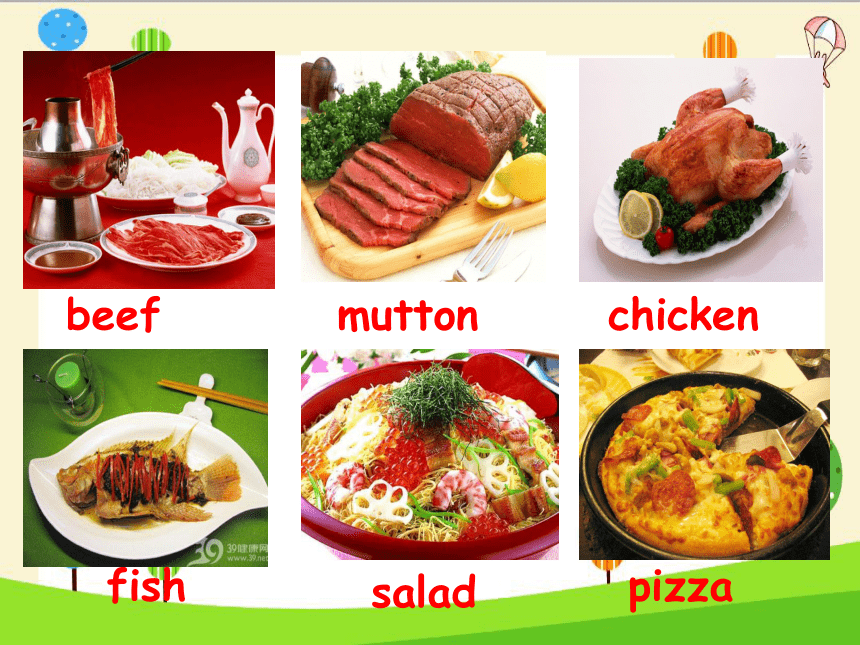
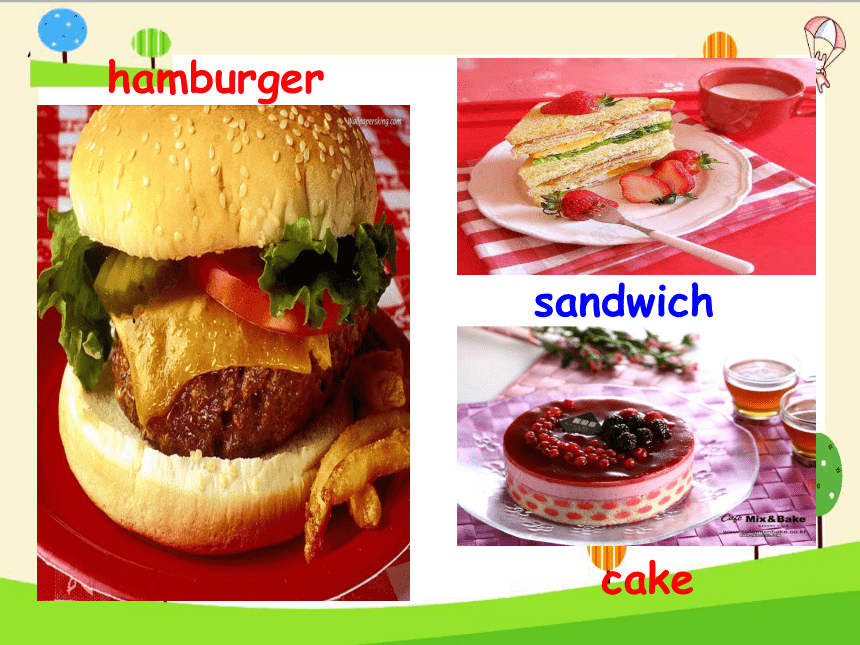
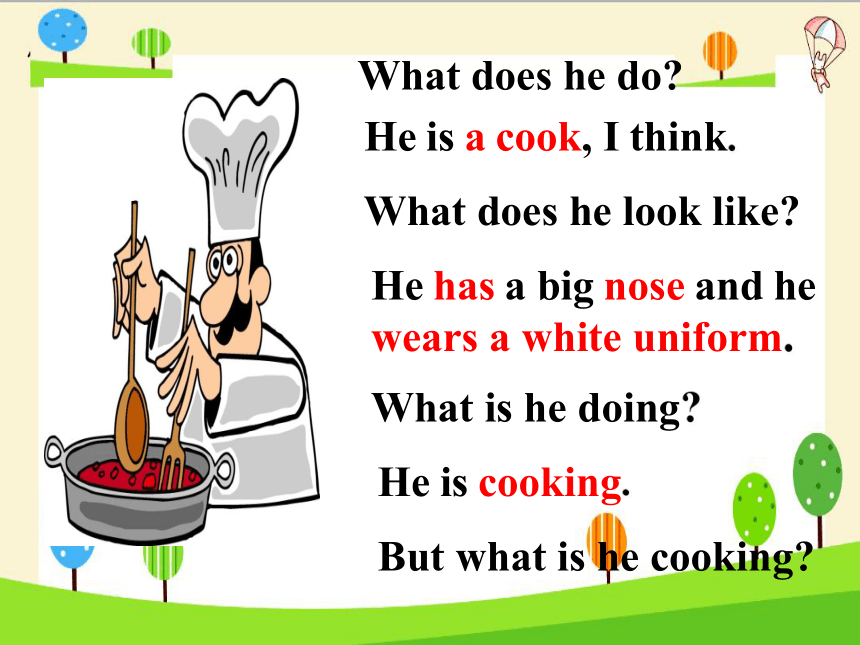
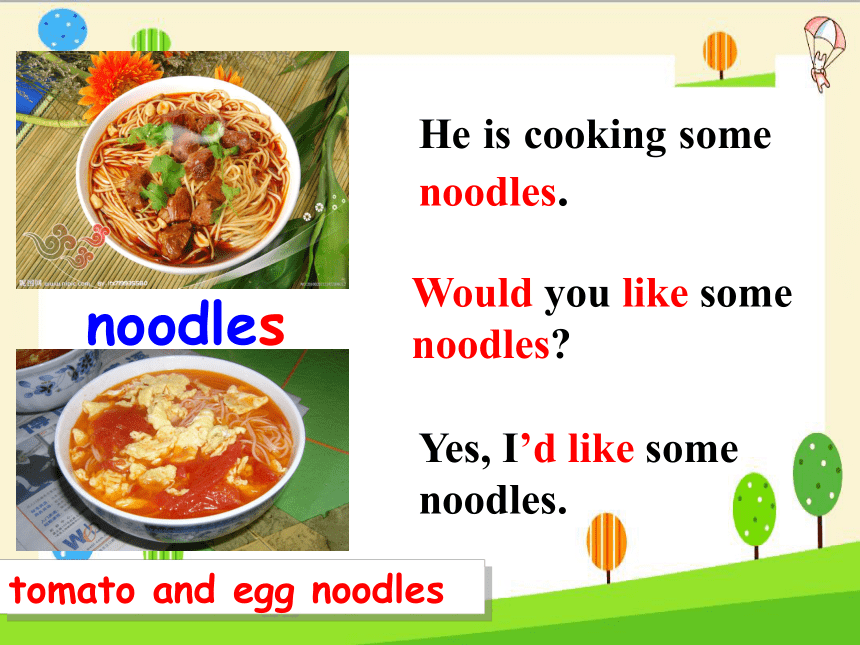
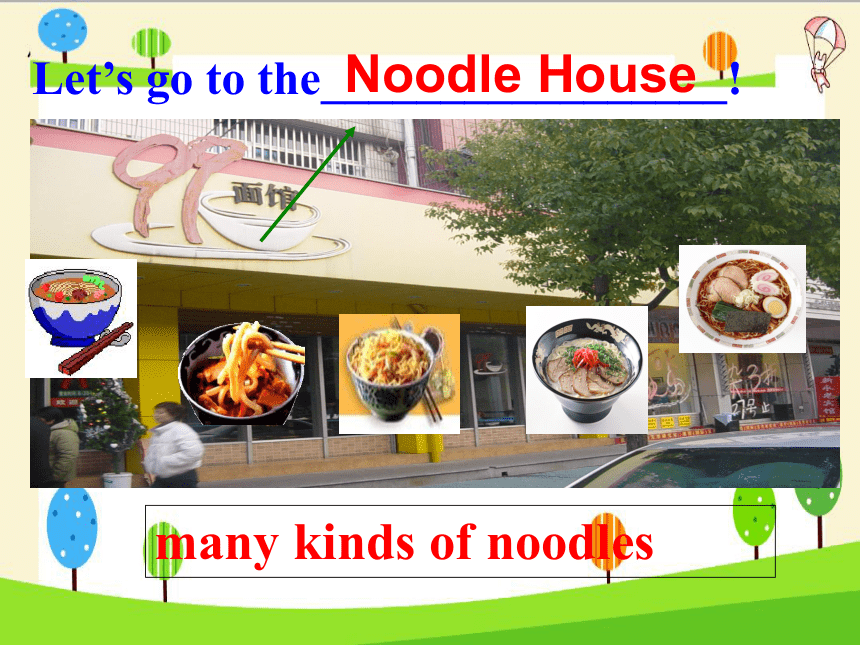
文档简介
(共30张PPT)
I’d like= I would like
意为: 想要, 愿意
与动词want同义, 但语气上比
want 更委婉, 更礼貌。
Explanation
What can you see in
these pictures
Do you like these
vegetables and fruits
Do you know these
vegetables and fruits
What kind of food would you like
I would like…
banana
strawberry
grape
apple
pear
orange
tomato
potato
cabbage
broccoli
carrot
onion
beef
mutton
chicken
fish
salad
pizza
hamburger
sandwich
cake
What does he do
What is he doing
What does he look like
He is a cook, I think.
He is cooking.
He has a big nose and he
wears a white uniform.
But what is he cooking
He is cooking some
noodles.
Would you like some
noodles
Yes, I’d like some
noodles.
noodles
tomato and egg noodles
Let’s go to the_________________!
many kinds of noodles
Noodle House
A: Do you want to eat noodles
B: Yes, I do./ No, I don’t.
noodles
A: Do you like noodles
B: Yes, I do./ No, I don’t.
beef and tomato
noodles
chicken and cabbage noodles
mutton and potato
noodles
some specials in the Noodle House.
Special 1
Special 3
Special 2
A:What kind of noodles would you like
B: I’d like beef and tomato noodles.
Special 1
Special 2
Special 3
Special 4
(牛肉)
(羊肉)
beef and ____________noodles.
chicken and __________noodles.
________and potato noodles.
What ______of noodles _______ you like
I’d like......
(牛肉)
I’d =I would
kind
would
tomato
mutton
cabbage
Are you hungry Let’s go to the restaurant!
(特色菜)
Special
A: What kind of noodles
would you like
B: I’d like beef and tomato
noodles.
Special 1
A: What kind of noodles would you like
B: I’d like chicken and cabbage noodles.
Special 2
A: What kind of noodles would you like
B: I’d like mutton and potato noodles.
Special 3
I’m not sure yet. Are there any vegetables in the beef noodles
What would you like
Yes, there are some tomatoes.
OK. I’d like the beef noodles.
1. A: What would you like 您需要什么?
B: I’m not sure yet. 我还没想好。
would like 和want 表示“要;想要”,但比want语气委婉、客气。其后可接名词、代词宾格或动词不定式。其中,would是情态动词,常可缩写为’d。
例如:
I’d like a cup of black tea with milk, please.
请给我来杯奶茶的红茶。
I want some hot tea, Mom.
妈妈,我想喝些热茶。
would like的固定句型
1)Would you like some … 你想要一些 ……吗?
该句型常用于征求对方的意见。肯定回答常用Yes, please.,而否定回答常用No, thanks.。需要注意的是,在该句型中要用some,而不用any,以表示说话人希望得到肯定回答。如:
— Would you like some apples
你想要一些苹果吗?
— Yes, please. 是的,我想要。
— No, thanks. 不,谢谢。
2). Would you like to … 你愿意去做……吗?
该句型表示向对方有礼貌地提出建议或发出邀请,其中like可用love替换。如:
— Would you like / love to play football with me
你想要和我一起踢足球吗?
— Yes, I’d like / love to. 是的,我非常愿意。
— I’d like / love to, but I’m too busy.
我非常愿意,但我太忙了。
3). would like to do sth. 想要做某事
would like sb. to do sth. 想要某人去做某事
He would like to go out for a walk.
他想要出去散步。
Our parents would like us to study well.
我们的父母想要我们好好学习。
2. May I take your order 我可以点餐吗?
order n. 点餐;命令
He gave his order to the waiter.
他把他点的东西告诉服务员了。
They will start the moment they receive the order.
他们一接到命令就出发。
order v. 命令;定购;整理;点餐
I want to order a ticket.
我想订一张票
Go and ask if they are ready to order.
去问问他们是否准备点菜了。
some和any 既可以修饰可数名词又可以修
饰不可数名词, some常用在肯定句中, 而
any则常用在否定和疑问句中。所以, some
和 any 的区别在于: some和any 的用法主要
是考虑用在肯定句、疑问句还是否定句中, 与名词的可数与否无关。
3.some和any的用法
some的用法: some意为“一些”,可作形
容词和代词。它常修饰可数名词复数。
如:some books 一些书,
some boys 一些男孩,
也可修饰不可数名词:
some water 一些水,some tea 一些茶叶,
some 常用在肯定句中。
any的用法: any意为“任何一些”,它也
可修饰可数名词复数或不可数名词,常
用于疑问句和否定句。如:
I can’t see any tea. 我没看见茶叶。
Do you have any friends at school
你在学校有些朋友吗
但在表示建议,反问,请求的疑问句中,或
期望得到肯定回答时,多用some而不用any。
如:Would you like some coffee
你要不要来点咖啡
How about some fruit juice
来点水果汁如何
当any表示“任何”的意义,起强调作用时,
它可以用在肯定句中;
如:Any student can answer this question.
任何学生都可以回答这个问题。
4. What size would you like
你想要多大尺寸的?
size作名词,意思是“大小”, 可指尺寸、规模、身材等, 也可作“号码, 尺码”解, 此时是可数名词。
例如:
What size of collar is this shirt 这衬衣领子的尺寸是多少?
I’d like= I would like
意为: 想要, 愿意
与动词want同义, 但语气上比
want 更委婉, 更礼貌。
Explanation
What can you see in
these pictures
Do you like these
vegetables and fruits
Do you know these
vegetables and fruits
What kind of food would you like
I would like…
banana
strawberry
grape
apple
pear
orange
tomato
potato
cabbage
broccoli
carrot
onion
beef
mutton
chicken
fish
salad
pizza
hamburger
sandwich
cake
What does he do
What is he doing
What does he look like
He is a cook, I think.
He is cooking.
He has a big nose and he
wears a white uniform.
But what is he cooking
He is cooking some
noodles.
Would you like some
noodles
Yes, I’d like some
noodles.
noodles
tomato and egg noodles
Let’s go to the_________________!
many kinds of noodles
Noodle House
A: Do you want to eat noodles
B: Yes, I do./ No, I don’t.
noodles
A: Do you like noodles
B: Yes, I do./ No, I don’t.
beef and tomato
noodles
chicken and cabbage noodles
mutton and potato
noodles
some specials in the Noodle House.
Special 1
Special 3
Special 2
A:What kind of noodles would you like
B: I’d like beef and tomato noodles.
Special 1
Special 2
Special 3
Special 4
(牛肉)
(羊肉)
beef and ____________noodles.
chicken and __________noodles.
________and potato noodles.
What ______of noodles _______ you like
I’d like......
(牛肉)
I’d =I would
kind
would
tomato
mutton
cabbage
Are you hungry Let’s go to the restaurant!
(特色菜)
Special
A: What kind of noodles
would you like
B: I’d like beef and tomato
noodles.
Special 1
A: What kind of noodles would you like
B: I’d like chicken and cabbage noodles.
Special 2
A: What kind of noodles would you like
B: I’d like mutton and potato noodles.
Special 3
I’m not sure yet. Are there any vegetables in the beef noodles
What would you like
Yes, there are some tomatoes.
OK. I’d like the beef noodles.
1. A: What would you like 您需要什么?
B: I’m not sure yet. 我还没想好。
would like 和want 表示“要;想要”,但比want语气委婉、客气。其后可接名词、代词宾格或动词不定式。其中,would是情态动词,常可缩写为’d。
例如:
I’d like a cup of black tea with milk, please.
请给我来杯奶茶的红茶。
I want some hot tea, Mom.
妈妈,我想喝些热茶。
would like的固定句型
1)Would you like some … 你想要一些 ……吗?
该句型常用于征求对方的意见。肯定回答常用Yes, please.,而否定回答常用No, thanks.。需要注意的是,在该句型中要用some,而不用any,以表示说话人希望得到肯定回答。如:
— Would you like some apples
你想要一些苹果吗?
— Yes, please. 是的,我想要。
— No, thanks. 不,谢谢。
2). Would you like to … 你愿意去做……吗?
该句型表示向对方有礼貌地提出建议或发出邀请,其中like可用love替换。如:
— Would you like / love to play football with me
你想要和我一起踢足球吗?
— Yes, I’d like / love to. 是的,我非常愿意。
— I’d like / love to, but I’m too busy.
我非常愿意,但我太忙了。
3). would like to do sth. 想要做某事
would like sb. to do sth. 想要某人去做某事
He would like to go out for a walk.
他想要出去散步。
Our parents would like us to study well.
我们的父母想要我们好好学习。
2. May I take your order 我可以点餐吗?
order n. 点餐;命令
He gave his order to the waiter.
他把他点的东西告诉服务员了。
They will start the moment they receive the order.
他们一接到命令就出发。
order v. 命令;定购;整理;点餐
I want to order a ticket.
我想订一张票
Go and ask if they are ready to order.
去问问他们是否准备点菜了。
some和any 既可以修饰可数名词又可以修
饰不可数名词, some常用在肯定句中, 而
any则常用在否定和疑问句中。所以, some
和 any 的区别在于: some和any 的用法主要
是考虑用在肯定句、疑问句还是否定句中, 与名词的可数与否无关。
3.some和any的用法
some的用法: some意为“一些”,可作形
容词和代词。它常修饰可数名词复数。
如:some books 一些书,
some boys 一些男孩,
也可修饰不可数名词:
some water 一些水,some tea 一些茶叶,
some 常用在肯定句中。
any的用法: any意为“任何一些”,它也
可修饰可数名词复数或不可数名词,常
用于疑问句和否定句。如:
I can’t see any tea. 我没看见茶叶。
Do you have any friends at school
你在学校有些朋友吗
但在表示建议,反问,请求的疑问句中,或
期望得到肯定回答时,多用some而不用any。
如:Would you like some coffee
你要不要来点咖啡
How about some fruit juice
来点水果汁如何
当any表示“任何”的意义,起强调作用时,
它可以用在肯定句中;
如:Any student can answer this question.
任何学生都可以回答这个问题。
4. What size would you like
你想要多大尺寸的?
size作名词,意思是“大小”, 可指尺寸、规模、身材等, 也可作“号码, 尺码”解, 此时是可数名词。
例如:
What size of collar is this shirt 这衬衣领子的尺寸是多少?
同课章节目录
- Unit 1 Can you play the guitar?
- Section A
- Section B
- Unit 2 What time do you go to school?
- Section A
- Section B
- Unit 3 How do you get to school?
- Section A
- Section B
- Unit 4 Don't eat in class.
- Section A
- Section B
- Unit 5 Why do you like pandas?
- Section A
- Section B
- Unit 6 I'm watching TV.
- Section A
- Section B
- Review of Units 1-6
- Unit 7 It's raining!
- Section A
- Section B
- Unit 8 Is there a post office near here?
- Section A
- Section B
- Unit 9 What does he look like?
- Section A
- Section B
- Unit 10 I'd like some noodles.
- Section A
- Section B
- Unit 11 How was your school trip?
- Section A
- Section B
- Unit 12 What did you do last weekend?
- Section A
- Section B
